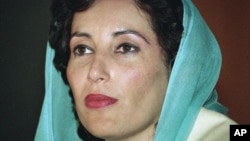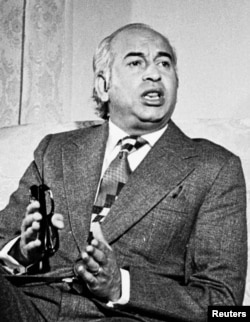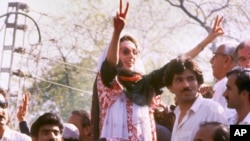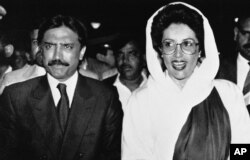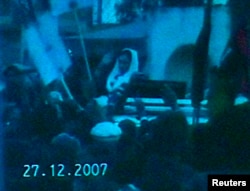Twenty-eight years ago today, Benazir Bhutto was sworn in as prime minister of Pakistan, not only becoming the first woman to head a Muslim country, but at the age of 35, its youngest.
Her charismatic father, Zulfikar Ali Bhutto, served as both Pakistan's president and prime minister, and founded the Pakistan People’s Party (PPP). Born into a wealthy and educated family, Benazir was groomed by her father to be his political successor.
A populist who was recognized internationally as an skilled diplomat and impressive leader, he ultimately was deposed in 1977 by his army chief General Mohammad Zia-ul-Haq. Ali Bhutto was tried and convicted of authorizing the murder of a political opponent in 1979. He was executed by hanging later that year.
Zia, an conservative Islamist, ruled Pakistan with an iron fist. Benazir Bhutto and her siblings spoke out often against the military government, becoming the de facto political opposition. Wary of her influence, Zia jailed Bhutto for several years. After her release, she lived in London in exile. By the time she returned to Pakistan in 1986, Benazir had become a beloved opposition politician, and frustration with Zia's dictatorship offered Bhutto the chance to politically challenge the military government.
By then, she had becpme a symbol of women's empowerment in a deeply religious society.
Benazir's first return from exile
She won the post of prime minister in 1988, running as a moderate Muslim, who pledged to provide basic services and education to Pakistan's poor and illiterate. And Bhutto made good on some of those promises, bringing electricity, housing and other necessities to parts of rural Pakistan.
But as a young and inexperienced woman in conservative Muslim country, she faced intense backlash by the political remnants of Zia’s dictatorship and conservative Islamist. Bhutto lost the 1990 election and was charged, along with her husband, of corruption.
She returned to power in 1993, but lost her second term just three years later.
While in self-imposed exile in Britain and Dubai, she was convicted in 1999 of corruption and sentenced to three years in prison.
She directed the PPP from abroad, she was reaffirmed its leader in 2002.
Five years later, Bhutto was determined to return to Pakistan to challenged the military government, then led by President Pervez Musharraf, who had granted her amnesty on the corruption charges. That very day she narrowly escaped an assassination attempt.
Less than two months later in December 2007, she was assassinated during a gun and suicide bomb attack after a political rally. She was 54 years old.




